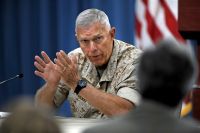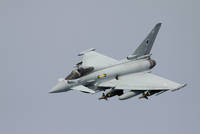WASHINGTON, Aug. 24, 2010 — The commandant of the Marine Corps predicted a continued Marine presence in southern Afghanistan well after July 2011, when a transfer of security responsibilities to the Afghan government is slated to begin.
“I honestly think it will be a few years before conditions on the ground are such that turnover will be possible for us,” Gen. James T. Conway told reporters today during a Pentagon briefing.
Conway briefed reporters on his recent trip to the Central Command area of responsibility, during which he visited Afghanistan, Pakistan, Romania and Germany. He spent most of his trip visiting Marines and sailors in southern Afghanistan’s Helmand province, an official said.
Helmand and its neighboring province of Kandahar are the birthplace of the Taliban, Conway noted, and the conditions there vary from other regions. “If you look at the numbers of attacks, numbers of casualties; if you look at the focus of the main effort – that is, the view of the commanders there – the fight is in the south,” he said.
Conway declined to pinpoint the length of time a Marine presence would be needed there. However, “I do not believe conditions in … Helmand or Kandahar … are going to be such that we think we can simply turn over to Afghan forces and leave,” he said.
The key to success in Helmand, Conway said, is to move people’s loyalties off the fence and onto the side of Afghan and international security forces. While slow to happen, he’s seeing signs of progress toward this end, he said, with less corrupt and better-skilled police forces, more projects, and district and subdistrict governors overseeing the rule of law.
“When [the International Security Assistance Force] is able to construct a self-contained cell phone system,” Conway said, “I’m convinced that tips and intelligence will pick up, making it virtually impossible for the Taliban to operate while hiding behind the citizens.”
Conway noted that the Taliban are trying to “string” out the situation in Marja, located in Helmand province, for as long as they can since they realize the loss will be a major defeat for them.
“We are dealing with a very intelligent enemy here who realizes that Marja, probably more than any other battle in Afghanistan, has the capture of an international audience,” he said. “And so they’re not giving up that easily.
“They’re sniping at us, there’s throwing a few rounds here and there, they’re shooting at our helicopters,” he continued, “but mainly, they’re intimidating people … so as to maintain a presence there and keep Marja from being, again, this strategic victory on the part of Marines in the south of Helmand.”
Conway praised the Marines serving in Helmand province. They embody the meaning of expeditionary, he said. Their ability to be fast, flexible and lethal throws the enemy off balance, he explained, and it’s not uncommon to find units away from their forward operating bases for 30 days at a time.
“Using superior firepower and battlefield mobility, I believe that they hold the initiative,” he said of the Marines. “Even in the height of the Taliban’s so-called fighting season, they are making the enemy react to them.”
Conway also acknowledged the challenges that lie ahead. The Afghan army’s capacity is hitting a critical stage, he said. Army Lt. Gen. William B. Caldwell IV, commander of NATO Training Mission Afghanistan and Combined Security Transition Command Afghanistan, is ahead of schedule in training Afghan infantry companies and kandaks, or battalions, he said, although the quality “varies widely.”
But the toughest part of Caldwell’s mission- recruiting and training Afghan military aviators and enablers — lies ahead, Conway said. Enablers are the equivalent of the Marines’ combat support units, he explained.
“Those troops will require a higher level of education and skills training than his ‘grunt’ units have required to date,” he said. “That said, the organization and approach that he and his joint combined team have taken appears to be, to the interested observer, just right for the task at hand.”
A military force shapes the environment, Conway said, with better security enabling other lines of operation, such as the economy and government, to take shape.
“That’s why what General Caldwell and his people are doing is so important,” Conway said. “That’s why we’re partnering right now, almost on every patrol, with Afghan security forces when we go out. That’s why we want to posture the police, so they can be successful.”
The goal is to transition an increasing amount of responsibilities to host nation forces.
“When we think that we have sufficiently beaten down the insurgency in the area, we have sufficiently built up the Afghan capability to deal with what’s there, then I think we have done the essence of what we were sent there to do,” he said.
Conway acknowledged reports that indicate Americans are “increasingly growing tired of the war,” but he noted that the last of the 30,000 troops President Barack Obama ordered to Afghanistan have only just arrived this month.
Military leaders need to do a better job of convincing Americans of the need for the war in Afghanistan, Conway said.
“I don’t think that we have done a strong enough job in convincing the American people there are good and just reasons why we have to destroy al-Qaida and the associated Taliban in Afghanistan, similar to what we did in Iraq,” he said, “certainly to the point where there is no future opportunity for safe haven, certainly to the degree that we can create conditions for that Afghan government to rule the country and avoid safe haven.”
While Americans may not all support the war, the general noted that they firmly support the troops. “I am so proud of our American public, that regardless of how they see what happened in Iraq or what’s happening in Afghanistan, they support the troops,” Conway said. “And that’s the message that they get from me; that’s the message that they see when they come home to dwell. And in that regard, I’m just incredibly proud of our country.”
Source:
U.S. Department of Defense
Office of the Assistant Secretary of Defense (Public Affairs)

 von
von 
